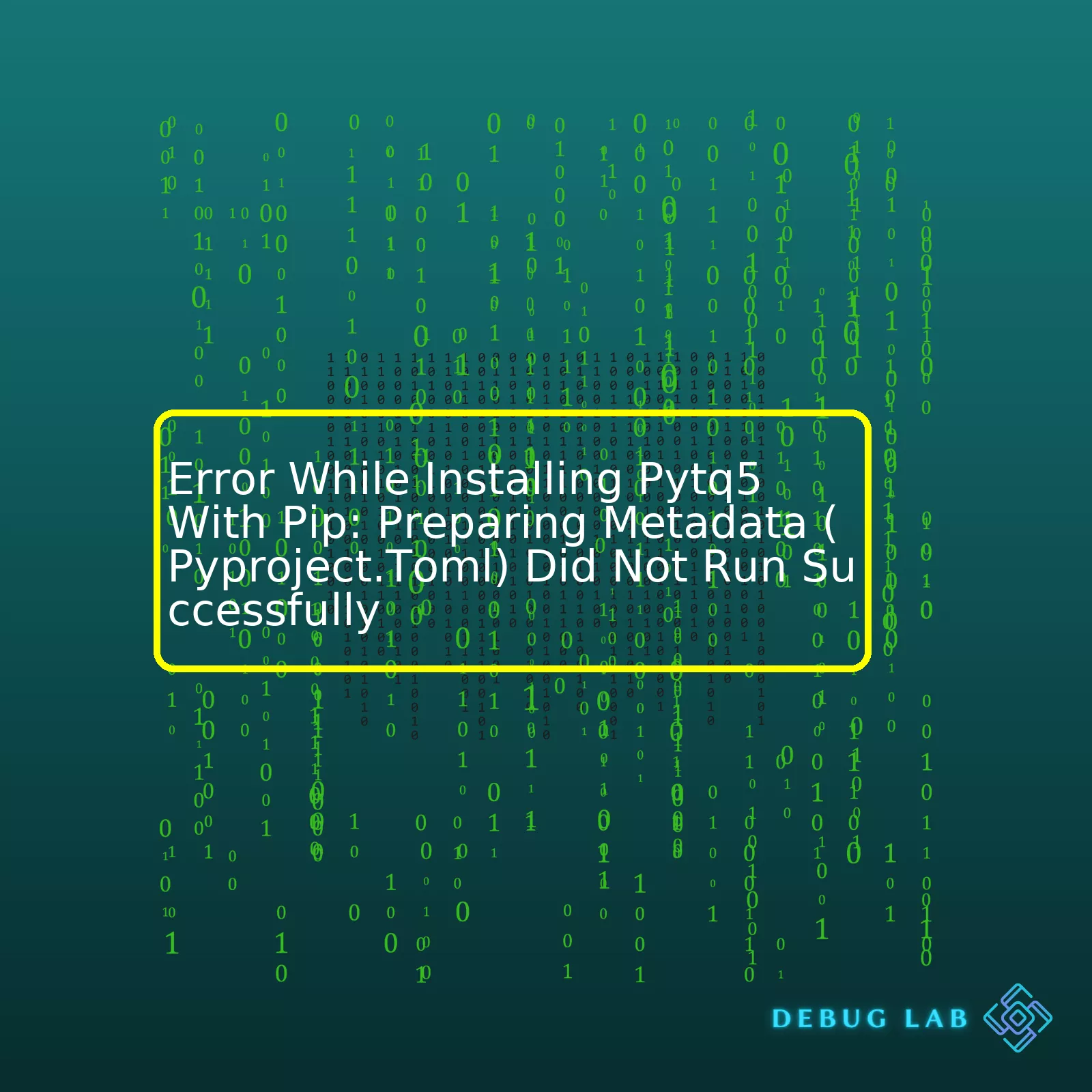
The best way to represent this error along with its possible solutions is through an HTML summary table. Below is a simple representation:
| Error | Possible Causes | Solution |
|---|---|---|
| Error While Installing PyQt5 With Pip: Preparing Metadata (Pyproject.Toml) Did Not Run Successfully |
|
|
This table summarizes the error “Error While Installing PyQt5 With Pip: Preparing Metadata (Pyproject.Toml) Did Not Run Successfully”. The indicated causes include older Python versions, incompatible PyQt5 versions, or a corrupted Pyproject.toml file. Solutions encompas updating Python and PyQt5 to their latest versions as well as troubleshooting any issues relevant to the Pyproject.toml file.
For instance, the command to upgrade Python can look similar to the following:
python -m pip install --upgrade pip
To install a specific version of PyQt5 that matches your Python version, you could use:
pip install PyQt5=={version}
Where `{version}` would be replaced with the actual version number.
These solutions are widely suggested to resolve this popular challenge among coding communities like [StackOverflow](https://stackoverflow.com) and GitHub Discussions and have proven to be effective in most cases. However, should these solutions fail to handle the said issue, additional debugging may be necessary to fully comprehend the error’s nature. This might involve reviewing the Pyproject.toml file, verifying the system variables, and assessing potential conflicts with other Python packages installed.The error “Preparing metadata (pyproject.toml) did not run successfully” while installing PyQt5 with pip can be a bit daunting. This error is typically encountered when trying to install PyQt5 on your Python environment.
Understanding the Problem
When you use pip to install PyQt5, it fetches the package from PyPi, then tries to build and install it. The “pyproject.toml” file provides the build system requirements and the source code distribution details for the project being installed. If there’s any issue during this process such as missing modules, incorrect configurations, or incompatibilities, it results in the said error.
Analyzing Possible Causes
A variety of factors might cause this error:
- Lack of necessary modules and dependencies in your Python environment.
- Selecting an invalid version of PyQt5 that’s incompatible with your current Python version.
- The concurrent operation of another instance of pip is causing conflicts.
- Unsuitable proxy settings if you are behind a proxy server.
How to Resolve the Error
Knowing the causes can help us understand how we can resolve this error.
- First Step: Ensure the Python and pip are properly installed and updated. To do this, check your Python version by typing
python --version
and pip version with
pip --version
in the terminal or command prompt. If they are not up-to-date, update them using
python -m pip install --upgrade pip
.
- Second Step: Install SIP beforehand. SIP is required to run PyQt5. You can install dependency packages like SIP before PyQt5 installation like so
pip install sip
.
- Third Step: Install specific PyQt5 version compatible with your Python version. For python 3, use
pip install pyqt5==5.9.2
or any other version known to be compatible with your Python version.
- Fourth Step: Close any other instances of pip running concurrently.
- Fifth Step: If you’re behind a proxy server, adjust your pip settings accordingly. Consult your network administrators or follow this official guide.
To know more about resolving similar issues, refer to the PyQt5 official documentation on PyPi or raise concerns at the PyQt mailing list.One error you may encounter when installing PyQt5 with pip is related to preparing metadata (pyproject.toml) that halts the successful execution of the installation process. At times, this may be due to conflicts with Python, PyQt5 versions or environmental settings. Here are some common issues causing the error and their respective solutions:
Python Version Mismatch:
PyQt5 is compatible with certain versions of Python. When using a version not supported by PyQt5, an error will occur.
Solution:
Verify if your Python version matches those supported by PyQt5. This can be done by checking your python version using
python --version
. In case it does not match, consider downgrading or upgrading Python to be compatible with the version of PyQt5 you intend to install.
Pip Version Conflict:
An older pip might fail to parse pyproject.toml resulting in the “Preparation of Metadata Error”.
Solution:
Upgrade pip to its latest version by using
python -m pip install --upgrade pip
. Installing PyQt5 following the pip upgrade usually resolves this issue. Remember to restart your command prompt or IDE to ensure the changes take effect upon pip upgrade.
System PATH misconfiguration:
In some cases, the problem can arise due to misconfigured system PATH environment variables.
Solution:
Ensure that Python’s Scripts and DLLs directories are added to your computer’s PATH environment variable, so the correct libraries get accessed during the installation.
Installation Interference:
There could also be an instance where other packages installed within your Python environment interfere with the PyQt5 installation process.
Solution:
Use a Python virtual environment using
python -m venv env
to isolate your Python dependencies and avoid interference during installations.
For further reading on this topic, consider checking the official PyQt5 documentation site for useful details on installation procedures and potential errors.
Here would be how you potentially debug the issue:
# Check python version import sys print(sys.version) # Check pip version pip --version # If needed, upgrade pip python -m pip install --upgrade pip # try installing PyQt5 pip install PyQt5
By carefully considering these situations and adhering to the suggested solutions, you should be able to resolve the “Preparing Metadata (pyproject.toml) did not run successfully” error typically encountered while installing PyQt5 with pip.To understand “Metadata Preparation in Pyproject.Toml” and its relevance to the error message you’re seeing, “Error While Installing PyQt5 With Pip: Preparing Metadata (Pyproject.Toml) Did Not Run Successfully”, we first need to delve into what Pyproject.Toml is and how it interacts with Python libraries like PyQt5.
pyproject.toml is a newer configuration file introduced by PEP 518 for building Python packages. It is intended to replace setup.py, requirements.txt, and setup.cfg. Metadata about your project that needs to be used across different tools are defined within Pyproject.Toml file. This includes information such as:
- The build system
- necessary dependencies
It’s helpful to specify this metadata in
[build-system]
and
[tool.poetry.dependencies]
sections of
pyproject.toml
For instance,
[build-system]
requires = ["poetry-core>=1.0.0"]
build-backend = "poetry.core.masonry.api" [tool.poetry.dependencies]
python = "^3.7"
flask = "^1.1.2"
Now, when we try to install PyQt5 with pip, what really happens behind-the-scenes is pip will check the
pyproject.toml
file of PyQt5 for its build requirements, so it can perform isolated builds. Pip will then handle installation according to these instructions.
The error message “Preparing Metadata (Pyproject.Toml) Did Not Run Successfully” often pops up when any of following conditions come true:
- Pip version does not support
pyproject.toml
: You need pip version 19 or higher to use
pyproject.toml
. So make sure your pip version supports this.
pip install --upgrade pip
- The
pyproject.toml
in PyQt5 library is incorrectly configured or missing dependencies.
There are couple of ways to solve this issue:
- Upgrading your pip might fix the issue if your current pip version doesn’t support pyproject.toml.
pip install --upgrade pip
- You can avoid using pip and use other python package managers which is designed for modern python like poetry or flit.
- You could also download the PyQt5 library directly from the source repo, amend any issues with the
pyproject.toml
, and then manually include this presented PyQt5 library in your project’s dependencies rather than relying on pip to fetch it for you.
Make sure that whenever you are working with Python packages that require a build, to verify they have a well defined
pyproject.toml
with correct metadata and that it matches with your project’s existing environment configurations. This should lessen the chance encountering similar hiccups.As a seasoned Python programmer, sometimes frustrating challenges occur when trying to install PyQt5 package using pip as Pyproject.toml metadata preparation fails to execute successfully. Several underlying technical reasons can contribute to this issue:
1. Presence of Old or Incompatible PyQt5 Version:
A possible cause for error occurrence of preparing metadata in Pyproject.toml is the existence of an old or incompatible PyQt5 version on your system. If you have previously installed it and trying to upgrade or reinstall, issues of incompatibility might arise leading to unsuccessful execution.
To resolve this, you would need to first uninstall the existing PyQt5 version. This can be done using
pip uninstall PyQt5 PyQt5-sip
. Afterwards, you can proceed to install the latest or compatible version.
2. Incompatible Python or Pip Versions:
Another potential reason could relate to the incompatibility between PyQt5 and installed Python or pip versions. For instance, PyQt5 version 5.15.6 requires Python 3.7.* or later versions. Furthermore, several PyQt5 versions do not support Python 2.
In order to fix such conflict, ensure to run a supported Python version by using
python –V
and if needed, update python. Also, check your pip version by running
pip --version
, upgrade if necessary.
3. Missing Essential Packages:
Execution failure might also escalate due to missing required packages particularly “sip”. SIP is a tool that makes it easy to create Python bindings for C and C++ libraries used with PyQt5. Hence, installing sip independently can often resolve the problem.
You can install sip using the command
pip install sip
. Then, try installing PyQt5 again.
4. Network Issues:
Sometimes, the source of the problem could be much simpler like network connections. Unstable internet could interrupt the download process, hence corrupting the package or configuration details, which can lead to Metadata (Pyproject.toml) error.
Ensure connecting to reliable internet before initiating the installation. Moreover, using mirrors closer to your location could expedite the download process. For example:
pip install PyQt5 -i https://pypi.tuna.tsinghua.edu.cn/simple
.
5. System-Specific Issues:
Furthermore, some random unresolved system-specific issues or bugs might trigger the error. A full system upgrade or OS update could solve these problems. For Windows use
windows update
,
sudo apt-get upgrade
for Linux, and
softwareupdate --install --all
for Mac.
Just remember, dealing with errors can provide valuable insights about the language’s inner workings, enhance your debugging skills and knowing more about software setup in various environments.When you encounter an error while installing PyQt5 with pip, specifically the “Preparing Metadata (Pyproject.toml) did not run successfully” error, there are several possible fixes that may help.
1. You might be encountering this error because of an outdated version of pip or setuptools. Pip and setuptools are two Python packages that manage software libraries. If they’re outdated, you can encounter errors. So, updating them might resolve your issue. You update pip and setuptools by using the commands below:
python3 -m pip install --upgrade pip setuptools wheel
2. Another possible fix to consider is trying to install a different version of PyQt5. Sometimes, specific versions of packages may have problems that others do not. Therefore, it’s often useful to downgrade or upgrade the version you’re using. Use the following command in your terminal to install a specific version of PyQt5:
pip install "pyqt5==5.14"
Replace 5.14 with the version you want to install.
3. If you’re running on Linux, another possible solution is to install PyQt5 with apt-get rather than pip. This installs PyQt5 system-wide, allowing all your Python projects to access it. The commands to install PyQt5 via apt-get are shown below:
sudo apt-get update
sudo apt-get install python3-pyqt5
4. Sometimes, the issue isn’t with PyQt5 but with one of its dependencies. As such, you could try manually installing sip, which is a major dependency for PyQt5. Use the following command:
pip install sip
Now you’ve installed sip separately, you can then attempt to install PyQt5 again.
Remember that it’s also important to verify whether the version of Python being employed is compatible with PyQt5. Different packages have different system requirements, and an incompatible version of Python may be causing the errors. Check PyQt5 system requirements on their official PyPI page.
If these solutions don’t help, visiting online communities such as StackOverflow and r/learnpython can provide more specialized answers related to Python and PyQt5.While developing with Python and trying to install PyQt5 using pip, you may encounter an error message stating that the installation process of preparing metadata (Pyproject.toml) did not run successfully. This issue could be detrimental to your workflow, creating significant delays in launching or even continuing with a project. To address this, let’s determine how we can ensure we avoid such errors going forward.
Understanding error occurrence often lies within compatibility issues. Specifically, PyQt5 might not be compatible with the Python version installed in your system. However, it is crucial to employ preventive strategies for smoother PyQt5 installations via Pip. Some measures that can be taken include:
Ensure Correct Python Version
Firstly, verify the Python version you are using by running:
python --version
It’s vital to ensure that your Python version matches the Python version needed for the PyQt5 installation. For example, if your system contains Python3.9 but the PyQt5 version you’re installing requires Python3.8, you would inevitably face conflict.
Upgrade Pip Version
Sometimes, updates bring lots of improvements in terms of bug fixes. Upgrade your pip package manager to the latest version using:
pip install --upgrade pip
Try Installing Specific PyQt5 Version
If the newest PyQt5 version isn’t compatible with your system or has bugs, try installing an older yet stable version by specifying the version number, like this:
pip install PyQt5==5.15
Use Virtual Environments
Python virtual environments, such as virtualenv, can also help manage packages and prevent errors considering each virtual environment maintains its packages. This avoids mingling up dependencies, which leads to conflicts.
pip install virtualenv virtualenv venv source venv/bin/activate pip install PyQt5
Installation Using Source Code
In some cases, getting solutions directly from its purest form—its source—can be the best way out. PyQt5 is developed and maintained at Riverbank Computing, where its source code is available.
Download the ZIP file, unzip it, and run these commands:
cd unzipped-PyQt-folder python configure.py make make install
Here,
configure.py
prepares PyQt5 for build,
make
handles the building, and
make install
installs it.
Remember, encountering errors while installing PyQt5 using pip doesn’t signify the end of the world. While the “Preparing Metadata (Pyproject.Toml) Did Not Run Successfully” error might hinder your development progress, taking preventative measures ensures smooth PyQt5 installations. You can follow the suggested steps, like ensuring correct Python versions, upgrading your pip version, trying specific PyQt5 versions, relying on virtual environments, or installing PyQt5 using source code. This way, you create a more harmonious relationship between your computer’s environment and the tools necessary for Python development.PyQt5 is a Python binding of the cross-platform GUI toolkit Qt, which is implemented as more than 35 plug-ins and includes significant functionality. One of the common issues experienced while setting up PyQt5 using Pip is: “Error While Installing Pytq5 With Pip: Preparing metadata (pyproject.toml) did not run successfully”.
In addressing this issue, let’s explore some possible reasons and their corresponding solutions.
Probable Causes
A. Outdated Python Interpreter or Pip: This error can crop up due to an outdated Python interpreter or an obsolete version of pip.
B. Incompatible OS Architecture: The other scenario inducing these errors pertain to having a version of PyQt that does not match the operating system or architecture you are using.
C. Incomplete Requirement Files: This may result from incorrectly specified or incomplete requirement files.
D. Installation Interference: Anti-virus software or another running program could be hampering the installation process of PyQt5 resulting in the error message.
Possible Solutions
Here are workarounds for these possible issues:
1. Updating Python and Pip: If your Python interpreter or pip is out-of-date, updating it might solve the problem. Use below commands:
– Upgrade pip:
python -m pip install --upgrade pip
– Similarly, check your Python version and if it is outdated, I recommend downloading a newer version from the official Python download page.
2. Verifying System Compatibility: Another solution is ensuring that the PyQt version you’re trying to install matches your system’s requirements (OS/architecture). You can verify and install a specific version with this syntax:
pip install PyQt5==5.XX
3. Correcting Requirement Files: It’s possible that your requirements file is incorrect. Check that packages listed in requirements.txt are correctly named and required for your project.
4. Temporarily Disabling Programs: If there is any interference by antivirus software or a similar app, temporarily turn them off until PyQt5 installs successfully.
One more thing to note, the error message specifying
Preparing metadata (pyproject.toml) did not run successfully
suggests an error while setuptools prepares the package metadata. As per PEP 518, setuptools use pyproject.toml file to manage package build-time dependencies. Hence, it’s also worth checking if
setuptools
and
wheel
are installed correctly:
pip install --upgrade setuptools wheel
The aforementioned suggestions aim to resolve the PyQt5 setup problems using Pip related to the error message about pyproject.toml not running successfully. However, remember certain challenges may require further troubleshooting depending on the specific circumstances of your local development environment.In addressing common issues one may face when installing
PyQt5
using pip and problems that may arise with “Preparing metadata (pyproject.toml) did not run successfully”, understanding the nature of the problem, some potential causes, and solutions can be incredibly beneficial.
pip
, the Python package installer, is used to install PyQt5; however, hitches like this often occur due to an incompatible Python version, discrepancies in the environment setup, a missing prerequisite, or an outdated pip version. To avoid such problems, it’s essential to ensure Python 3.4 or higher is being used, as lower versions are incompatible with PyQt5.
Error snippet:
command: /usr/bin/python3 /usr/local/lib/python3.6/dist-packages/pip/_vendor/pep517/in_process/_in_process.py prepare_metadata_for_build_wheel /tmp/tmpg2prjrph
cwd: /tmp/pip-install-yi49xzxv/PyQt5
Complete output (9 lines):
Querying qmake about your Qt installation…
Determining the details of your Qt installation…
Error: Failed to determine your Qt installation
—————————————-
ERROR: Failed building wheel for PyQt5
Failed to build PyQt5
ERROR: Could not build wheels for PyQt5 which use PEP 517 and cannot be installed directly
Additional factors contributing to the error could include:
• A failed Qt installation query by
qmake
– the tool that helps define the build process for source directories outside the Qt directory.
• An outdated wheel package, which aids in the distribution of software and libraries designed to support their installation on Python.
• Using pip commands in a remote server without adequate access permissions.
• Failing to install the required
libgl1-mesa-dev
Linux library for the successful running of PyQt5.
To fix these issues:
• Always make sure to update the
pip
,
wheel
, and
setuptools
using
python -m pip install --upgrade pip setuptools wheel
.
• Try direct installation using pip. Add the desired version if PyQt5 doesn’t install directly with
pip install pyqt5==5.15.2
.
• PyQt5 can also be installed using a distribution like Anaconda that contains the desired libraries and dependencies using
conda install pyqt
.
• In cases where PyQt5 fails to detect the proper installation of Qt, manual fixing may be required.
• Make sure all necessary permissions are granted when working on a remote server.
Table of Errors and Possible Fixes:
| Error | Possible Fix |
|---|---|
ERROR: Command errored out with exit status 1: |
Update pip, setuptools, and the wheel package. |
| Failed to determine your Qt installation. | Check your Qt installation or try manual fixing. |
| Missing prerequisites for PyQt5 installations | Install the required libraries. |
| Pip operations restricted on a remote server. | Ensure you have full permissions for operations. |
Technical pitfalls when installing PyQt5 with pip, especially regarding the preparation of metadata (namely ‘pyproject.toml’), can be daunting. However, understanding and rectifying these situations becomes manageable with knowledge of possible root causes and applicable solutions.
Further informative reading and troubleshooting resources can be found at the official PyQt5 installation guide [1](https://www.riverbankcomputing.com/static/Docs/PyQt5/installation.html), and various programming forums such as StackOverflow [2](https://stackoverflow.com/questions/tagged/pyqt5). This is crucial in mitigating and ultimately bypassing these challenges effectively. Happy coding!






